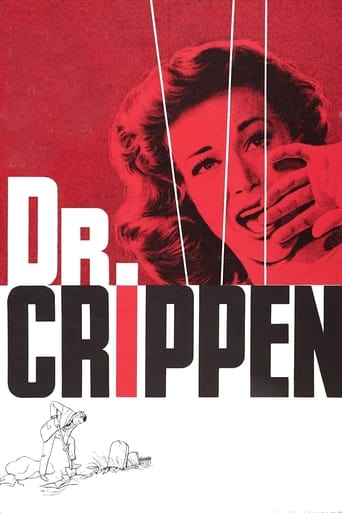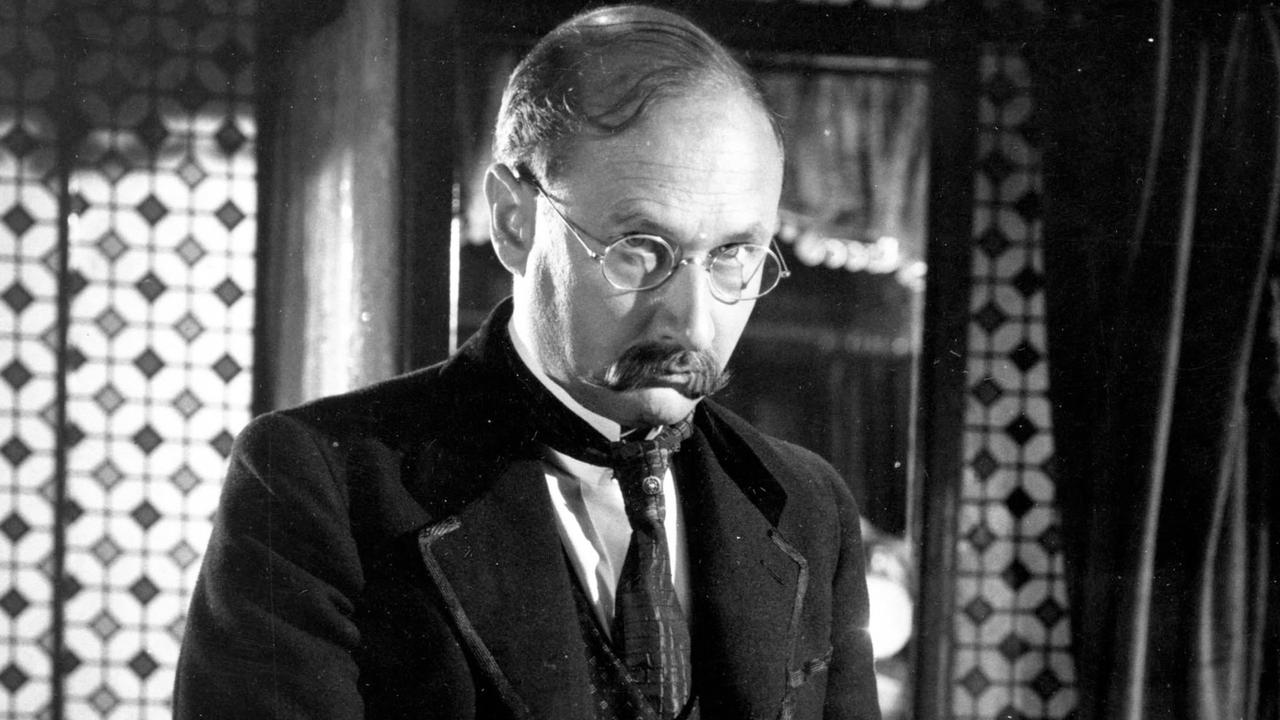dougdoepke
A dour little movie, with flat out ugly photography and ill-matched pairings. In short, the 90- minutes is something of an ordeal to sit through, that is, if you have the usual movie expectations. I don't know what the director told lead actor Pleasance (Crippen), but he acts like he swallowed a lemon throughout, even when in the loving company of the luscious Eggar (Ethel). I know he's supposed to be repressed, but his permanent paralysis appears unreal. Then too, seeing this unpleasant little middle-aged man paired with the lovely young Eggar amounts to more than a stretch. Then there's Belle (Brown), his boisterously unfaithful wife. About five-minutes into the film and I was hoping someone would strangle her and rescue my ears. The movie's only mystery is why it took him so long.The case itself, from books I've read, was pretty much open-and-shut against the doctor. Certainly he had reasons to commit the crime, which coincides with the movie. However, I suspect the element of doubt about his intentions that the movie introduces was an invention to add a provocative note to an otherwise unremarkable screenplay. Certainly, Crippen is presented as a somewhat sympathetic character by movie's end, which looks like a belated effort to humanize an otherwise one-note performance. Anyhow, the lead characters come across more like stereotypes than real people. And that along with the truly grim-faced production amounts to a forgettable movie experience.
theowinthrop
I have done some reviews before on some programs or movies that were based on the murder of Cora Crippen (i.e. "Belle Elmore") one century ago. The two movies that come to mind are WE ARE NOT ALONE (Paul Muni, Flora Robson, Henry Daniell) based on James Hilton's blistering novel of authority gone to seed, and THE SUSPECT (Charles Laughton, Stanley Ridges, and again Henry Daniell) which dated the story back eight years, and added a killing as well as altering that final dash across the ocean. Ian Holm appeared in We, THE ACCUSED, a few decades ago, in which the story was totally in the British Isles as well. The basics of the tale remain the same - sad, decent "doormat" husband of termagant wife turns on her and he and his decent girlfriend are destroyed by the society's ideas of justice, right and wrong. How true this is to the actual case is another matter.This 1962 film is rarely seen on television (I watched a ten part division of it on You Tube, but it appears to be complete). It was a fairly sparse production, the biggest expenses seeming to be the actors: Donald Pleasance as Dr. (or "Dr.") Hawley Harvey Crippen, Cora Browne as Cora Crippen, Samantha Egger as Ethel Le Neve, Sir Donald Wolfit as prosecutor Sir Richard Muir, and James Robinson Justice (who merited a separate cast listing in the opening credits) as "Captain McKenzie" of the Montrose (actually Captain Henry Kendall, who happened to be alive in 1962 - he died in 1965). The acting is excellent, especially that of Pleasance, Browne, and Egger. Aside from a model of the Montrose seen at night there were few special effects. But then few were needed.Crippen is the odd duck among British murderers or defendants in murder trials. Others were convicted and later doubt cast on the conviction - most notably Timothy Evans in the Christie Case (see 10 RILLINGTON PLACE), William Herbert Wallace for the murder of his wife in 1931 (see THE MAN FROM THE 'PRU), and Derek Bentley for being old enough to hang for the killing of a policeman by his friend and partner, the underage Christopher Craig (see "LET HIM HAVE IT CHRIS!"). Yet unlike the last three, who most people assume were innocent or less guilty (Bentley) than they were treated, Crippen is the reverse. Most people still believe he killed Cora, but feel he was under intense pressure from his victim. It's impossible to come to any agreement now on that point.Cora was oversexed, but there is evidence that Crippen initially was attracted to her when they married (by the way, he was married before, had a son, but his wife died - the son survived him). Cora had a hysterectomy (the surgery scar discussed in this film squeamishly avoids the reason for the scar). Tom Cullen in his book CRIPPEN: THE MILD MURDERER, has suggested that this was the true tragedy of the story - both wanted children. Had they had some it might have united them.Cora still could have sex and admirers, and did flaunt both. It disgusted her husband, but he kept quiet. She and her lovers (their "boarders") treated him with contempt, and an early scene of him cleaning their shoes shows how life was really cruddy for him. But eventually he hired Miss Le Neve, and found the great love of his life. Cora found out and the crisis arrived - and at the end she was dead.The film is taking it's cue from a theory (first voiced by the great British barrister Sir Edward Marshall Hall) that the hyoscin bromide given Belle was to calm her down and cut her sexual drive. Actually it is hard to tell - in sufficient doses hyoscin is deadly. So it proved here. Moreover Cora's head was never found in the remains, and some claimed they heard a gunshot that night. Possibly Hawley had to silence her screams due to giving her too much of the medication.Hawley's popularity was cemented by his insistence that Ethel not be mentioned at his trial (in fact, they had separate trials - not one like this film). Ethel was defended by F.E.Smith, the future Lord Chancellor Lord Birkenhead, and won acquittal. Hawley's decision to assure his own conviction to save Ethel is what makes him gain our respect in the end.Was he (as Filson Young tried to suggest) half spiritually good and half revolting? Possibly. I happen to wish his sentence had become a prison sentence, but it seems unlikely it could have been. That forgotten, pretentious spy novelist William Le Queux claimed he met Crippen who knew all about poisons, and Le Queux suggested he was one of the most dangerous men in the world. But most people liked him, including Inspector Walter Dew (who retired from the police after the conviction - he hated having to testify against the man who became his friend). But I leave you with this thought - he was a successful businessman in the sale of harmful, patent medicines and in questionable medical "institutes" for ear care. There was a darker side to Hawley we all tend to turn away from.
GarryQ
Brits complain about Americans stealing our inventions, yet we've been quite happy to claim two Americans, a quack doctor and a failed burlesque singer for our own. Casting 'Donald Pleasence'(qv) as the Doctor and Anglicised Aussie 'Coral Browne' (qv) as his insufferable wife not only seemed right but produced wonderfully atmospheric performances. I've only seen a TV version so it may be TV editing rather than the low budget that missed out, for example, Ethel wearing Mrs Crippens furs & jewellery to events. It would have helped see why the Doctor fell under suspicion. Made at a time when abolishing capital punishment and miscarriages of justices were under discussion in the UK it is not surprising the film suggests that the murder wasn't premeditated. In the light of his subsequent actions, you can decide yourself.The real `other woman' Ethel Le Neve, changed her name and died in Dulwich, SE London, in 1967 aged 89. If she saw this movie what did she think?
Eugene Kim
A compact, modestly budgeted movie that looks perfectly at home on home video (which is how I saw it). "Dr. Crippen" boasts flavorful performances by Donald Pleasence as the not-so-good doctor, Coral Browne as the long-suffering as well as insufferable Belle, and a pre-"Collector" Samantha Eggar as Ethel Le Neve, every unhappily married middle-aged man's fantasy. Casting the British-born Pleasence and Australian native Browne as the American Crippens hardly seems to matter. Eggar may have been too beautiful to play Le Neve (who, judging from photographs, was still a darkly attractive young woman). The movie is, perhaps, too economical; although we do get to see Crippen and Le Neve disguised as father and son for their ill-fated ocean voyage, I wished other colorful details of the case had also been re-created, such as Crippen's recklessly escorting Le Neve to a charity ball shortly after his wife's disappearance. As for the movie's suggestion that Crippen wasn't truly guilty of premeditated murder, my reply is: perhaps - but that doesn't really explain why Crippen cut up his wife's body and buried the pieces in the coal cellar.The real Ethel Le Neve was still alive when this film was first released (she died in 1967). One wonders if she saw it. One wonders what she thought if she had.


 AD
AD


